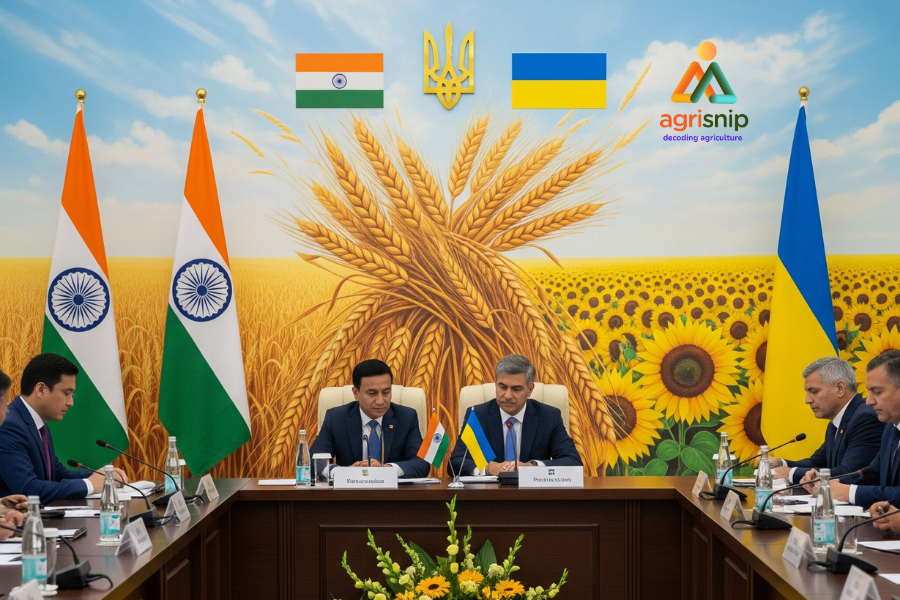
by Team Agrisnip | Jun 21, 2025 | Agri News, Global Agri, Technology
In a move to boost agricultural cooperation, India and Ukraine held their first Joint Working Group meeting on June 18, 2025. Key discussions focused on seeds, food safety, digital tech, and Ukraine’s agricultural exports to India—including apples, meat, and dairy.
India and Ukraine have taken a significant step in strengthening their agri-sector partnership. The first-ever India-Ukraine Joint Working Group on Agriculture met virtually on June 18, 2025, opening new avenues for collaboration in seed production, oilseed cultivation, horticulture, agricultural mechanisation, digital technologies, fisheries, and food safety.
Hosted online, the meeting was co-chaired by Oksana Osmachko, Deputy Minister of Agrarian Policy and Food of Ukraine, and Ajit Kumar Sahu, Director at the Indian Department of Agriculture and Farmers Welfare. The session brought together key representatives from ministries and regulatory bodies of both nations, including India’s FSSAI, Department of Animal Husbandry, and the Ministry of External Affairs.
One of the highlights was the successful delivery of the first trial shipment of Ukrainian apples to India—marking a fresh beginning in Ukraine’s agricultural exports to the Indian market. Both sides discussed future prospects for importing meat and dairy products, showing India’s growing interest in diversifying its agri-import sources.
Ukraine was also invited to participate in World Food India 2025, a major agri-food event to be held in New Delhi from September 25 to 28. This exhibition could open new business doors for Ukrainian agri-companies and give Indian stakeholders access to high-quality Ukrainian produce and technology.
The meeting set the tone for deeper collaboration ahead of the 7th session of the Inter-Governmental Commission (IGC) planned later in 2025. Ukraine welcomed India’s willingness to engage practically in the agri-sector and sees this partnership as critical, especially amid global food supply disruptions and climate challenges.
This new partnership offers a win-win for both nations—India can gain access to Ukraine’s rich agricultural outputs and machinery, while Ukraine taps into one of the world’s largest consumer markets.
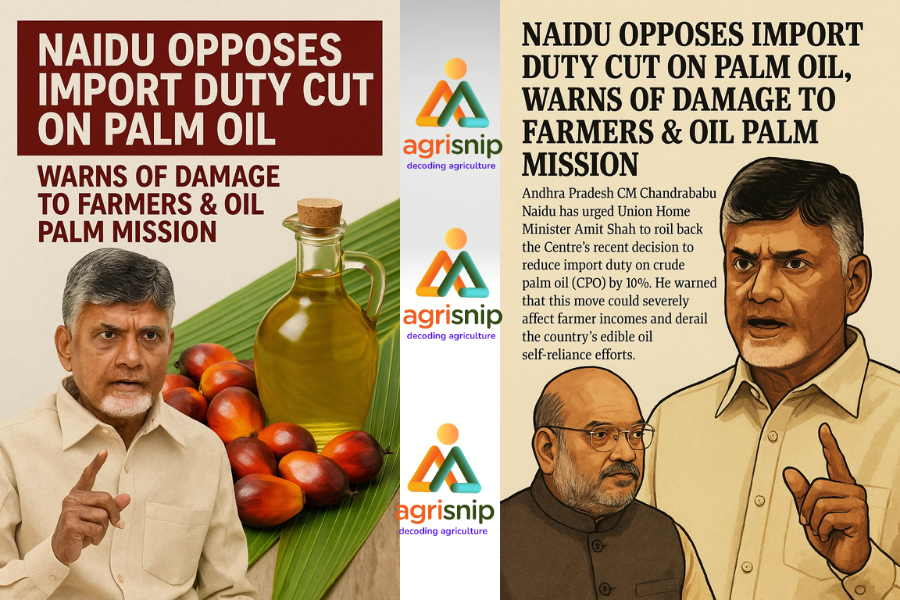
by Team Agrisnip | Jun 21, 2025 | Agri News, Food, Import / Export
Introduction:
Andhra Pradesh CM Chandrababu Naidu has urged Union Home Minister Amit Shah to roll back the Centre’s recent decision to reduce import duty on crude palm oil (CPO) by 10%. He warned that this move could severely affect farmer incomes and derail the country’s edible oil self-reliance efforts.
Andhra Pradesh Chief Minister N. Chandrababu Naidu has raised strong objections to the Central Government’s decision to reduce import duty on crude palm oil (CPO) by 10%, calling it a setback for Indian oil palm growers. In a formal letter submitted to Union Home Minister Amit Shah on June 20, 2025, Naidu urged for an immediate rollback of the policy.
The Centre’s decision, notified on May 30, comes at a crucial time—right in the middle of the oil palm plantation season. Naidu warned that the timing of the duty cut could lower the market price of domestic palm oil, demoralising existing growers and discouraging new farmers from entering this high-potential sector.
“This decision may seem helpful in the short term, but it undermines the long-term vision of India’s edible oil self-sufficiency under the National Mission on Edible Oils – Oil Palm (NMEO-OP),” the CM stated.
Andhra Pradesh is at the forefront of India’s oil palm revolution, accounting for over 50% of the total cultivated area, with 1.74 lakh farmers across 2.49 lakh hectares. Between 2021 and 2025, the state has covered 67,727 hectares and aims to add another 50,000 hectares this year under the NMEO-OP.
Naidu pointed out that Andhra Pradesh has been proactive in promoting oil palm cultivation by offering incentives, building infrastructure, and using AI-powered tools to support farmers. “Decisions like this could break the trust that has been built over the years with our farmers,” he warned.
The letter was submitted in person by a TDP delegation led by MP Lavu Sri Krishna Devarayulu and Union Civil Aviation Minister K. Rammohan Naidu, highlighting the state’s deep concern over national policy decisions that could undo years of progress in oil palm farming.
With stakes high for farmer income and the success of India’s edible oil mission, the ball is now in the Centre’s court to decide whether economic stability for growers will take precedence over short-term import cost management.
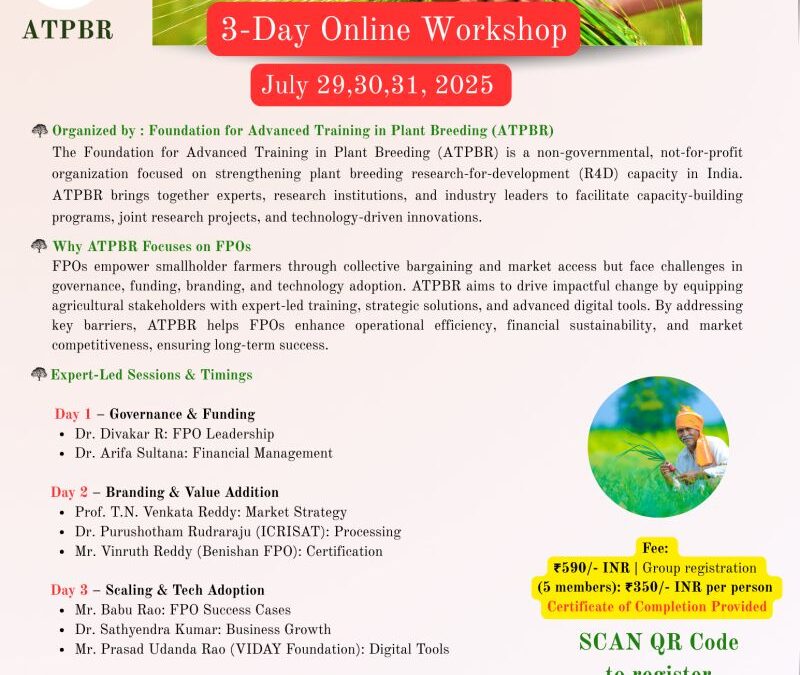
by Team Agrisnip | Jun 20, 2025 | Agri Events
🌾3-Day Online Workshop: Strengthen Your FPO for Long-Term Success
Running an FPO is tough—raising funds, building leadership, finding buyers, improving products… the list is long.
But you don’t have to figure it out alone.
Join our 3-day workshop designed to tackle these challenges head-on and give you tools that work.
📅 Dates: July 29, 30 & 31, 2025
💻 Where: Online (Join from anywhere)
💰 Fees: ₹590 per person | ₹350 for group (5+)
👉 After 20th June, the fee will change.
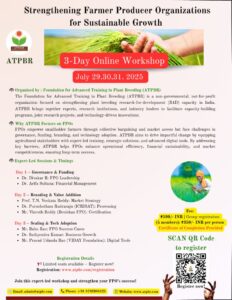
We Help You Solve:
Lack of funding → Smart finance & grant strategies
Weak leadership → Practical team-building tools
No buyers → Market access & buyer connection tips
Poor quality → Steps to upgrade and certify your products
Operations chaos → Easy digital tools to streamline your FPO
🎁 You Get:
Expert-led live sessions
Real case studies, real solutions
A certificate & pan – India network
📌 Register now: https://lnkd.in/gDTAJaFD
📧 Reach out: admin@atpbr.com
Please let us know if you have any questions or require further information.
Connect and follow us at Advanced Training in Plant Breeding
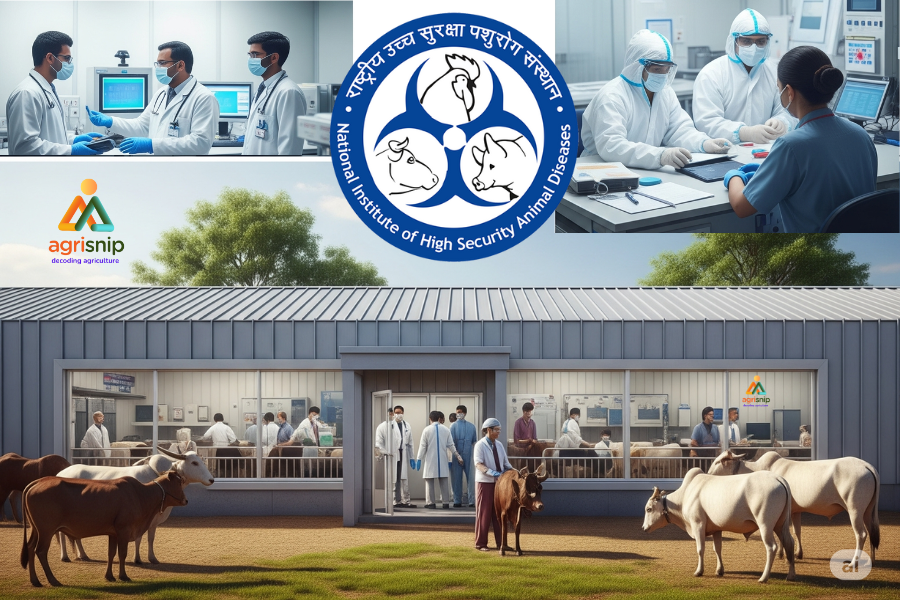
by Team Agrisnip | Jun 20, 2025 | Agri News, Livestock
India has earned global recognition as ICAR-NIHSAD Bhopal receives Category A Rinderpest Holding Facility status from WOAH and FAO. This places India among a select few nations trusted with safeguarding the world from a deadly livestock disease that once wreaked havoc.
In a significant achievement for India’s animal health sector, the ICAR-National Institute of High Security Animal Diseases (NIHSAD), Bhopal has been designated as a Category A Rinderpest Holding Facility (RHF) by the World Organisation for Animal Health (WOAH) and the United Nations Food and Agriculture Organization (FAO).
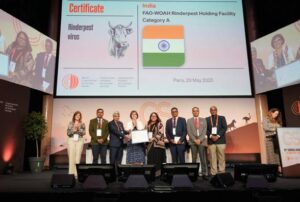
Image Ref: https://www.pib.gov.in/
This recognition, announced at the 92nd WOAH General Session in Paris on May 29, 2025, positions India among six elite global laboratories entrusted with the secure containment of Rinderpest Virus-Containing Material (RVCM). The certificate was received by Ms. Alka Upadhyaya, Secretary of the Department of Animal Husbandry & Dairying (DAHD) and India’s official WOAH Delegate.
Rinderpest—often called the “cattle plague”—was a deadly disease that devastated livestock populations for centuries. Although it was officially declared eradicated in 2011, the virus still exists in controlled lab environments to prevent accidental resurgence or bioterror threats.
The ICAR-NIHSAD facility, a Biosafety Level-3 (BSL-3) lab and WOAH reference center for avian influenza, had already been serving as India’s official RVCM repository since 2012. However, it was after a detailed international review in March 2025 that the institute was granted Category A RHF status for its advanced biosafety protocols, precise inventory systems, and emergency preparedness.
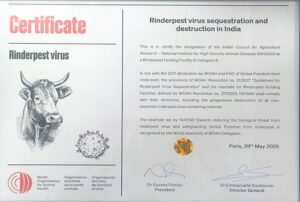
Image Ref: https://www.pib.gov.in/
“This achievement reflects our continued commitment to global biosecurity and the One Health approach, where human, animal, and environmental health are closely linked,” said Ms. Upadhyaya. She also noted India’s critical role in eradicating rinderpest and now in preventing its return.
The international committee has encouraged India to work towards Category B status, which would allow the country to handle vaccine seed material—another major step in reinforcing India’s stature in global veterinary science.
This milestone not only celebrates India’s scientific excellence but also reaffirms its readiness to lead in critical areas of animal health and bio-risk management on the world stage.
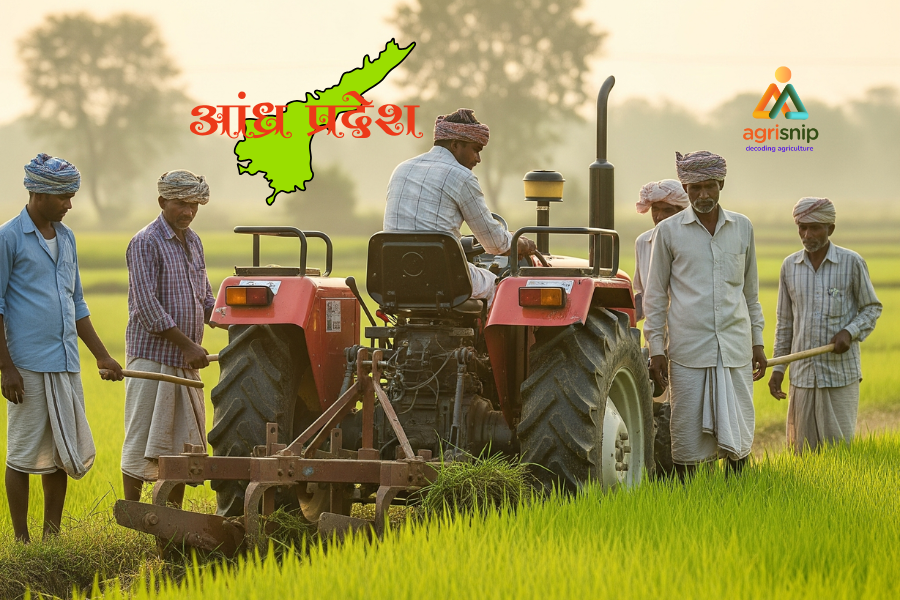
by Team Agrisnip | Jun 15, 2025 | Agri News, Farming
Andhra Pradesh’s revamped farm mechanisation scheme is creating waves among small and marginal farmers. Launched just 45 days ago, the program has already benefited over 25,000 farmers with ₹61 crore in subsidies for agricultural equipment.
Andhra Pradesh is making farm work smarter and easier. The state government’s newly relaunched farm mechanisation drive has seen an overwhelming response—benefiting more than 25,000 farmers within just 45 days. A total of ₹61 crore in subsidies has already been distributed to support the purchase of essential farm machinery.
This scheme is part of the Sub-Mission on Agricultural Mechanization (SMAM) and focuses especially on small and marginal farmers. What makes it more appealing this time is the new front-end subsidy model. Farmers now receive a 50% subsidy right at the time of purchase, unlike before when they had to pay the full price and wait for reimbursement. This has helped ease the financial stress on farmers and boosted confidence in adopting modern tools.
From land preparation to harvesting, the scheme covers a wide range of farm equipment. Special efforts are being made to reach remote tribal and rainfed regions, where farming is often more challenging. With these tools, farmers can reduce their dependency on manual labour, save time, and increase productivity.
The initiative is being managed through a smart digital solution—the Karshak Portal – FM App, developed by NIC-AP. It links data from various government departments like land records (Webland), crop details (ePanta), family eligibility (GSWS), forest land farming (Giribhoomi), and previous subsidies. This helps in accurate farmer verification and avoids duplication.
Everything—from applying and selecting beneficiaries to tracking progress and handling complaints—is done online, making the system fast and transparent.
The AP Agro Industries Development Corporation Ltd (AP AGROS) is leading the operations on the ground, ensuring smooth logistics, coordination with suppliers, and timely delivery of machinery.
According to Agriculture Department Director S Dilli Rao, the government is determined to scale up this initiative across all districts, ensuring that small and marginal farmers have the tools they need for a better future.
This initiative is not just about machines—it’s about transforming how farming is done in Andhra Pradesh.








